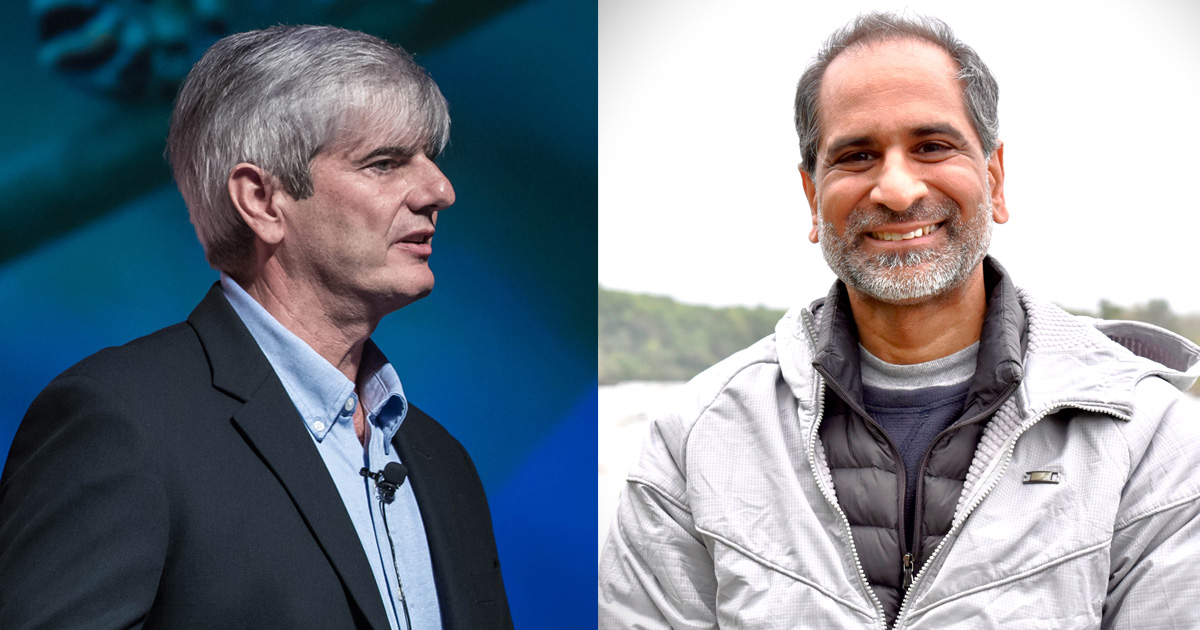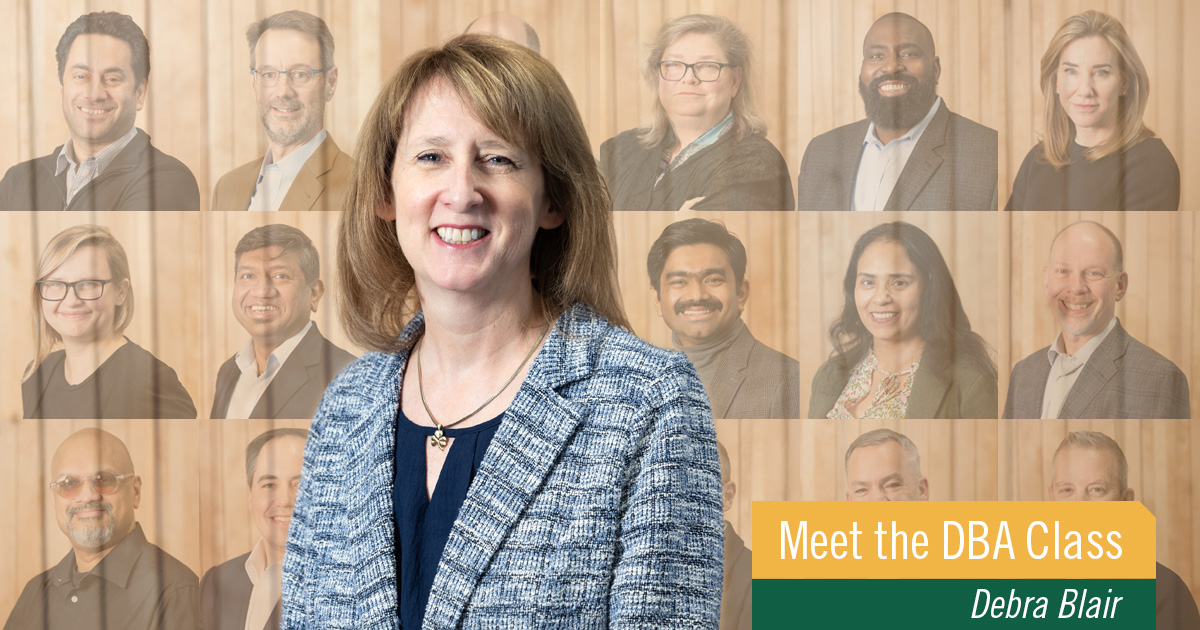Babson Honors Entrepreneurs Committed to Positive Global Change

From securing jobs for youths in under-resourced communities in Tunisia to pioneering ambitious social and environmental goals at a $1.3 billion company in Costa Rica, evidence of positive changes made by the latest recipients of Babson’s Global Changemaker Award can be seen across the world.
The 2023 honorees are Ramón Mendiola ’86, P’20 ’21 ’23, CEO of the Florida Ice and Farm Company (FIFCO), based in Costa Rica; and Pawan G. Patil, PhD, a social entrepreneur and economist who has worked for more than 25 years in development banking and eco-ethical innovation.
The Global Changemaker Award recognizes those in the Babson community for creating positive social and environmental change on a global level. The Institute for Social Innovation at Babson celebrates these changemakers and looks to promote Babson’s role in reshaping the world, whether on campus, in the local community, or on a global scale.
Cheryl Kiser, executive director at the Institute for Social Innovation, said both recipients were honored due to their lasting global impact and positive social change.
Ramón Mendiola ’86, P’20 ’21 ’23
Mendiola joined FIFCO, a Costa Rica-based beverage, food, and hospitality company, almost 20 years ago, but the CEO can easily recall his best days on the job.
“The two most important decisions that I feel the most proud of happened in 2008 and 2014, and in 2008, we decided to merge our business strategy with our corporate social responsibility strategy,” Mendiola said.
Although the term “triple bottom line”—meaning to expand a company’s bottom line to include profit, people, and the planet—was coined in 1994, there were no clear instructions on how to successfully implement the kind of corporate social responsibility that Mendiola envisioned. He started by talking to everyone at FIFCO.
“We had a systematic dialogue with our stakeholders. And, we asked them at that time, ‘What do you expect from us as a responsible company?’ ” Mendiola said.
The answers came loud and clear—more social responsibility and less waste.
Mendiola got buy-in from his senior management team and set up aggressive but attainable goals in terms of becoming a water-, waste-, and carbon-neutral company. He also changed the way its executives and leaders were remunerated annually based on the three dimensions, and committed to reporting the company’s progress publicly every year.
“This was a recipe that we created because there were no textbooks at that point,” Mendiola said.
“The two most important decisions that I feel the most proud of happened in 2008 and 2014, and in 2008, we decided to merge our business strategy with our corporate social responsibility strategy.”
Ramón Mendiola ’86, P’20 ’21 ’23
His next achievement came in 2014, when he decided to determine the company’s higher purpose.
“We came up with this statement that was so powerful for us, and that purpose is that we bring a better way of living to the world,” Mendiola said. “That simple statement is very powerful, and unites all our employees across our different business in every geography we operate. Even today it guides us on how we interact with one another and the business decisions we made.”
The vision led to the creation, among other social initiatives, of FIFCO Oportunidades, a program created to identify and support every FIFCO employee who lives in vulnerable socioeconomic conditions by helping them with housing, health, and finance education.
Mendiola, whose two sons also attended Babson, said he has been thrilled to be a part of Babson’s community. He serves on the Board of Trustees and hopes to bring entrepreneurial education to high school students in communities of need.
“I’d love my contribution to Babson to expand and influence some of the ways we are teaching today,” Mendiola said.
Pawan G. Patil
Patil spent part of his childhood in India with the mud-caked remnants of poverty only a half-generation away, something Patil’s parents wanted him to remember. His grandparents and father lived in huts in south-central India and depended on the land, forest, and a nearby river for shelter and sustenance.
“It really left an impression on me in terms of how important nature and a healthy natural environment is to human health, particularly the poor,” Patil said.
These early insights explain why Patil, who now works at the World Bank, became a devoted and ambitious student, racking up several degrees from prestigious colleges around the world. But, he dropped out as an undergraduate at Harvard University—something that hadn’t been in the plan.
“I had a passion for nature and wildlife and the poor dependent on both for life and living, but I didn’t really know my place in the world and what I could do to help. So, like any confused, intentional and passionate young person, I dropped out to discover my purpose, and on my own terms,” Patil said.
He scraped up enough money for a one-way ticket to Casablanca and lived on about $3 a day, traveling throughout Africa, befriending fishermen and other workers who depend on the land, eventually landing in Papua New Guinea. For Patil, it was a one-of-a-kind learning experience.
“In that process of going from one coast of the planet to the other, I discovered so much about people and their interrelationship with nature, and myself,” Patil said. “I discovered not only what my life’s purpose was, but what I wanted to do with it, and that was to truly address the poverty-environment nexus and improve millions of young lives.”
“In that process of going from one coast of the planet to the other, I discovered so much about people and their interrelationship with nature.”
Pawan G. Patil
Patil has since been able to focus on that link through three decades of work. As a veteran of the World Bank, for example, he helped build a multibillion-dollar sustainable ocean investment portfolio and co-created several long-running programs, including co-founding youth2youth, one of the largest youth serving volunteer networks across UN institutions.
He also has been able to apply his expertise outside the World Bank to philanthropic initiatives. He has worked with the Nike Foundation, and founded Silatech, the first youth-focused lending bank in Qatar, and SeaDragon, a foundation which incorporates music and art to appeal to investors’ hearts about the importance of keeping our oceans clean.
And, while Patil eventually returned to Harvard to complete his degree, he considers his friends in the Babson community to be an essential part of his brain trust. Kiser helped Patil recognize that major companies can prioritize positive social and environmental change as much as profit.
“Whenever Babson calls, I will drop everything to help support the vision and mission, because I think it’s so needed,” Patil said.




